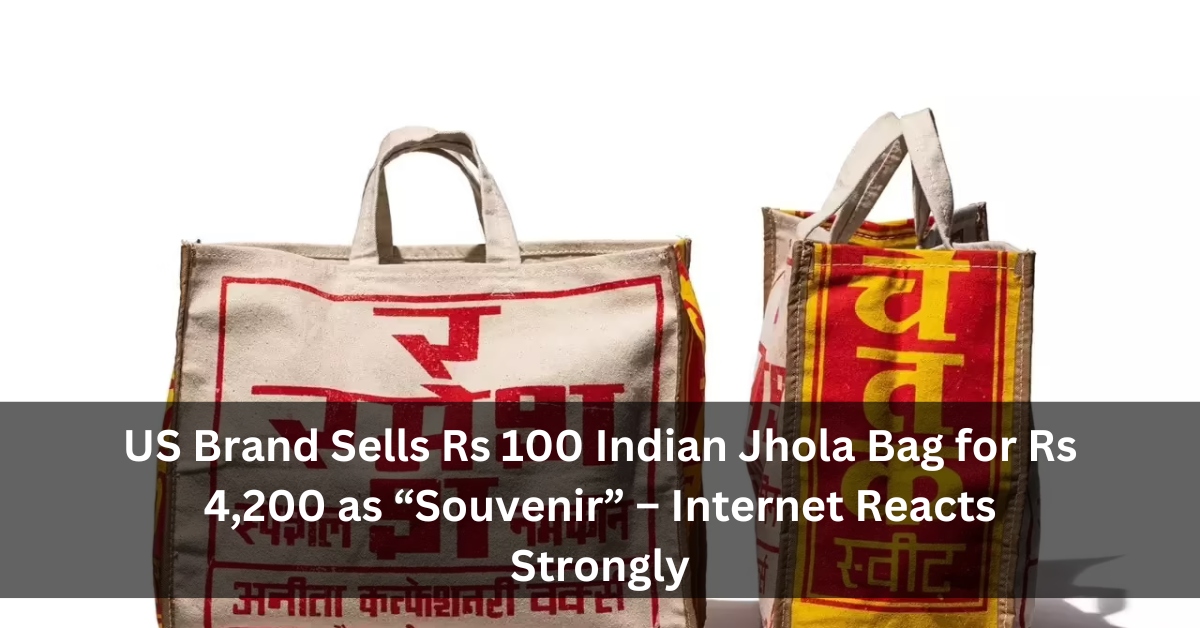US Brand Sells Rs 100 Indian Jhola Bag for Rs 4,200 as “Souvenir” – Internet Reacts Strongly
An American retail website is under fire for selling a basic Indian cloth bag—commonly known as the jhola—for over ₹4,200. The bag, which usually costs ₹50–₹100 in Indian markets or is even given away free by general stores, has been renamed the “Indian Souvenir Bag” and is being sold by the Japanese brand Puebco via US luxury store Nordstrom.
This news has left Indians both amused and angry, sparking discussions about culture, price inflation, and the global fashion industry’s obsession with “exotic” items.
What Is This “Indian Souvenir Bag”?
The jhola bag in question looks like a typical desi cloth bag, with colorful prints and local brand names like “Ramesh Namkeen” and “Chetak Sweets” printed in Hindi. In India, these bags are often reused for grocery shopping, carrying books, or daily errands.
But now, this everyday bag has turned into a “fashion item” for Western audiences. The Nordstrom listing describes it as “handmade” and “a nostalgic piece of India to carry with you.”
This exact same bag can be spotted at kirana stores, vegetable markets, and roadside stalls across the country. The local versions are not only eco-friendly but also a reflection of Indian street culture. Most importantly, they’re cheap—some even come free with snacks or sweets.
Why Are Indians Upset?
Once this news hit social media, it didn’t take long for people to start reacting. Twitter, Instagram, and Facebook were flooded with posts, jokes, and memes.
One user wrote, “My mom has 15 of these in the kitchen drawer. We’re sitting on a gold mine!”
Another said, “I knew fashion was weird, but this is just theft. They’re selling our dust bags as designer wear.”
Some were annoyed that a simple Indian bag is being sold abroad for nearly 40 times its local price. Others called out the act as another example of the West rebranding Indian culture and making money off of it—something often described as cultural appropriation.
Cultural Value vs Market Value
While some see this as a positive step—Indian items getting global attention—many argue that selling something so rooted in Indian daily life without proper credit is unfair.
In India, jholas are more than bags. They’re part of our lifestyle. Students, shopkeepers, artists, and even office-goers use them. They’re reusable, washable, and environment-friendly.
Turning this into a high-priced “souvenir” feels strange to many. It removes the cultural value and replaces it with a made-up luxury tag.
Not the First Time This Has Happened
This isn’t a one-off case. In the past, similar things have happened:
- Maggi noodles were once spotted in a UK store selling for ₹300 a pack.
- Good Day biscuits were sold as “imported cookies” in Canada.
- Alphonso mangoes, priced at ₹200 per dozen in India, were sold for ₹2,000 abroad.
Western markets often take local Indian products and sell them as “rare” or “premium,” which feels exploitative to many Indians.
So, Is It Cultural Appreciation or Appropriation?
This is a tricky topic. Appreciation is when a culture is respected, understood, and credited. Appropriation is when a culture is used without permission, and often for profit, without giving credit or understanding the original meaning.
In this case, many Indians feel the jhola bag is being appropriated. The bag is not just a design; it carries memories, practicality, and everyday usefulness. Turning it into a “chic souvenir” without context or credit is what bothers people.
What Can Be Done?
Some people are suggesting that Indian artisans or small businesses should take this as motivation. Why not market these bags internationally ourselves? Why let others profit from something that belongs to us?
If Indian brands start exporting these items with proper storytelling and fair pricing, the money will go to local craftspeople instead of foreign fashion giants.
Also, it’s important for Indian buyers to support local. Our products are often undervalued, but that doesn’t mean they’re worthless.
Final Thoughts
This isn’t just about a bag. It’s about how the world views Indian culture—either as a cheap resource or a fashion trend. The jhola bag is a symbol of simplicity, sustainability, and Indian identity. While it’s funny to see it sold at such a high price abroad, it also shows how important it is to own and protect our everyday culture.
The next time you pick up a jhola from your local shop, remember—it’s not just a bag. It’s now a “luxury souvenir.” And maybe, just maybe, you’re more fashionable than you think.
Stay tuned to Blog Lovin for more such trending news that connects you with what’s happening in India and around the world.







